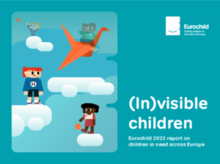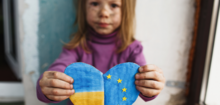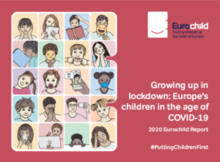Displaying 1 - 10 of 17
This week, the UNICEF Regional Office for Europe and Central Asia (ECA) and the Swiss Government kicked off the project “Supporting integration of refugee and migrant children in host EU countries,” with a technical meeting between the six participating countries: Bulgaria, Croatia, Hungary, Poland, Romania, Slovak Republic.
This report highlights the recommendations and priorities that EU decision-makers and national governments can do to support the most vulnerable children and prevent widening inequalities.
Eurochild has carried out an urgent mapping, with support from its members, UNICEF country teams and government representatives across 13 countries. The mapping examines the laws and policies at national level for children in alternative care and unaccompanied and separated children from Ukraine who arrive in the following countries: Czechia, Estonia, Germany, Greece, Hungary, Italy, Latvia, Lithuania, Poland, Romania, Slovakia, Spain and the United Kingdom.
The Task Force on Foster Care of the Transforming Children's Care Global Collaborative Platform held the second spotlight webinar series on identifying foster carers on 5 May 2022.
Children make up half of all refugees from the war in Ukraine, according to UNICEF and UNHCR. More than 1.1 million children have arrived in Poland, with hundreds of thousands also arriving in Romania, Moldova, Hungary Slovakia and the Czech Republic.
Adolescents living in residential youth care (RYC) are at risk for disadvantaged social relationships, which in turn present a risk factor for increased loneliness. Social relationships of Slovenian adolescents aged 15–18 years and living in RYC group homes or in their primary families were investigated by relying on the social convoy framework.
This report reflects on the effects of the coronavirus pandemic on children. It compiles information gathered from 25 countries across Europe, and provides recommendations for improving public policies in the short and long-term to support better outcomes for children and families, including children in alternative care or at risk of separation.
the UNICEF Regional Office for Europe and Central Asia (ECARO) is looking for a national consultant to be part of the core group to assist Slovakia in developing a national monitoring and evaluation (M&E) framework for substitute care for children and in building capacity to implement, evaluate, and develop it further over time.
Join this webinar to walk through the PROMISE Child Participation Tool and to discuss approaches and considerations for soliciting children’s views on their Barnahus experience.
The purpose of this webinar is to shed light on the specific experiences and issues of unaccompanied and separate girls in the European Response.



